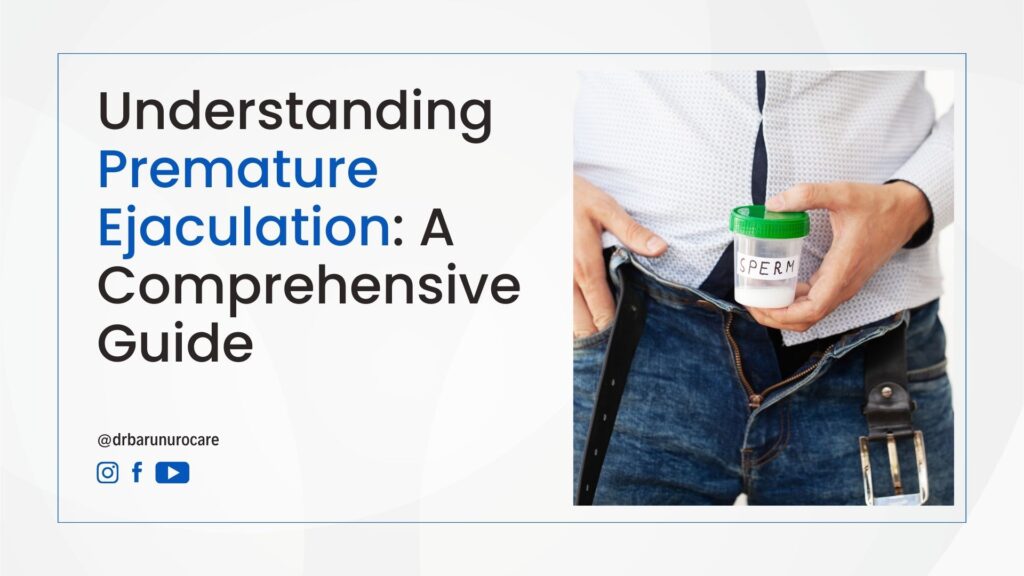Premature ejaculation is a common concern that can significantly impact a man’s self-esteem and relationship satisfaction. It’s often a topic shrouded in embarrassment, but it’s important to understand that it’s a treatable condition. While medical interventions certainly have a role, I believe that lifestyle factors can play a pivotal role in managing premature ejaculation.
In this article, we’ll delve into the connection between lifestyle and premature ejaculation. I’ll provide you with practical insights and evidence-based information to help you understand this condition better. Remember, taking control of your lifestyle can be a powerful step towards improving your sexual health and overall well-being.
Understanding Premature Ejaculation
Premature ejaculation is a complex issue with varying definitions. Essentially, it refers to the consistent or recurrent inability to delay ejaculation to allow satisfactory sexual intercourse. It’s important to note that what is considered “premature” can vary from person to person.
While it’s a common problem, many men feel embarrassed or ashamed to discuss it. However, it’s crucial to understand that you’re not alone. Studies suggest that premature ejaculation affects a significant portion of the male population in India.
Beyond the physical aspect, premature ejaculation can also take a toll on emotional well-being. It can lead to feelings of frustration, anxiety, and decreased self-confidence. It’s essential to recognize the psychological impact of this condition to address it comprehensively.
Lifestyle Factors Contributing to Premature Ejaculation
A multitude of lifestyle factors can contribute to premature ejaculation. Let’s explore some of the key areas:
Stress and Anxiety
Stress and anxiety are closely linked to sexual performance. When you’re constantly stressed, your body is in a state of heightened alert, which can interfere with sexual arousal and response. This heightened state can contribute to premature ejaculation.
Diet and Nutrition
Believe it or not, what you eat can impact your sexual health. A balanced diet rich in fruits, vegetables, and whole grains provides essential nutrients for overall well-being, including sexual function. Certain deficiencies can affect hormone levels and sexual performance.
Exercise and Physical Health
Regular physical activity is beneficial for both physical and mental health. Exercise helps improve blood circulation, which is crucial for sexual function. Additionally, it can help reduce stress and anxiety, which, as we’ve discussed, can contribute to premature ejaculation.
Sleep
Sleep is often overlooked when it comes to sexual health. Adequate sleep is essential for hormone regulation and overall well-being. Lack of sleep can lead to increased stress and fatigue, negatively impacting sexual performance.
Substance Abuse
Alcohol, tobacco, and certain drugs can affect sexual function. Excessive consumption of these substances can impair your ability to control ejaculation.
Obesity and Weight Management
Obesity can contribute to various health issues, including hormonal imbalances and erectile dysfunction. These factors can indirectly affect premature ejaculation.
Chronic Medical Conditions
Certain chronic medical conditions, such as diabetes, thyroid disorders, and multiple sclerosis, can impact sexual function. It’s essential to manage these conditions effectively to optimize sexual health.
Lifestyle Changes for Improvement
Making significant lifestyle changes can be challenging, but the rewards are substantial. It’s essential to approach these changes gradually and with patience.
Start by identifying the areas that need the most attention. Are you chronically stressed? Do you have an unhealthy diet? Or perhaps lack of sleep is a persistent issue? Once you pinpoint the key areas, you can create a tailored plan.
Remember, consistency is key. Small, sustainable changes are more likely to produce long-term results than drastic overhauls. Incorporate activities you enjoy into your routine to make it easier to stick with your plan.
Setting realistic goals is crucial. Don’t expect overnight miracles. Celebrate small victories along the way to stay motivated.
While lifestyle changes can be incredibly effective, it’s important to recognize that they may not be sufficient for everyone. If you’ve made consistent efforts and still experience significant difficulties, seeking professional help is advisable.
When to Seek Professional Help
While lifestyle modifications can be immensely helpful, it’s essential to recognize when professional guidance is necessary. If you’ve consistently implemented lifestyle changes and are still experiencing significant distress due to premature ejaculation, it’s time to consult a healthcare provider.
A urologist can evaluate your condition, rule out underlying medical issues, and discuss potential treatment options. Additionally, a therapist or counselor can help address psychological factors contributing to the problem.
Remember, seeking help is a sign of strength, not weakness. Many effective treatments are available, and with the right approach, you can regain control and enjoy a fulfilling sexual life.
Conclusion
Premature ejaculation can be a distressing condition, but it’s important to remember that you’re not alone. By understanding the role of lifestyle factors, you can take proactive steps to improve your sexual health.
While lifestyle changes often yield significant benefits, it’s crucial to seek professional guidance if you’re struggling. I encourage you to call us at 062899 58022 and schedule a consultation with me to discuss your concerns and explore potential solutions.
Remember, improving sexual function is a journey, not a destination. With patience, persistence, and the right approach, you can experience positive changes in your sexual well-being.
Frequently Asked Questions (FAQs): Premature Ejaculation and Lifestyle Factors
Q: Can diet really affect premature ejaculation?
A: Absolutely. A balanced diet rich in essential nutrients supports overall health, including sexual function. Certain deficiencies can impact hormone levels and sexual performance. Incorporating foods rich in antioxidants, vitamins, and minerals can be beneficial.
Q: How much exercise is needed to improve premature ejaculation?
A: The ideal amount of exercise varies from person to person. Aim for at least 150 minutes of moderate-intensity exercise per week. However, it’s important to listen to your body and avoid overexertion.
Q: Can stress and anxiety be the only causes of premature ejaculation?
A: While stress and anxiety are significant contributors, they are often accompanied by other factors. It’s essential to address both psychological and physical aspects for optimal results.
Q: Will losing weight help with premature ejaculation?
A: Maintaining a healthy weight is beneficial for overall health, including sexual function. Obesity can contribute to hormonal imbalances and other factors that affect sexual performance.
Q: How long does it take to see improvement after making lifestyle changes?
A: The timeline for improvement varies from person to person. Consistency is key. You may start noticing changes within a few weeks, but significant improvements might take longer.
Q: Can yoga or meditation help with premature ejaculation?
A: Yes, yoga and meditation are excellent tools for stress management and relaxation. These practices can help reduce anxiety and improve overall well-being, positively impacting sexual function.


